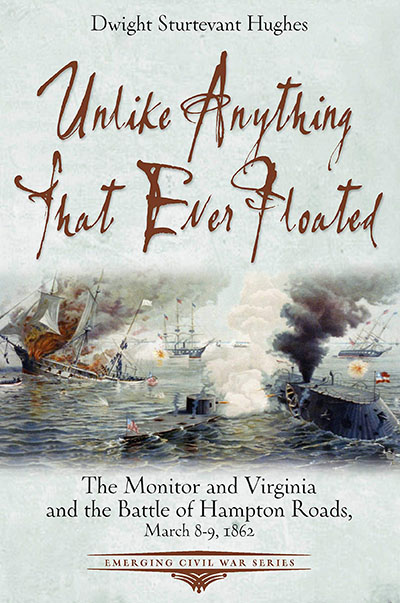
The Monitor and Virginia and the Battle Hampton Roads, March 8-9, 1862
From Savas Beatie (2021) for the award winning Emerging Civil War series.
“Ironclad against ironclad, we maneuvered about the bay here and went at each other with mutual fierceness,” reported Chief Engineer Alban Stimers following that momentous engagement between the USS Monitor and the CSS Virginia (ex USS Merrimack) in Hampton Roads, Sunday, March 9, 1862.
The day before, the Rebel ram had obliterated two powerful Union warships and was poised to destroy more. That night, the revolutionary—not to say bizarre—Monitor slipped into harbor after hurrying down from New York through fierce gales that almost sank her. These metal monstrosities dueled in the morning, pounding away for hours with little damage to either. Who won is still debated.
One Vermont reporter could hardly find words for Monitor: “It is in fact unlike anything that ever floated on Neptune’s bosom.” The little vessel became an icon of American industrial ingenuity and strength. She redefined the relationship between men and machines in war. But beforehand, many feared she would not float. Captain John L. Worden: “Here was an unknown, untried vessel…an iron coffin-like ship of which the gloomiest predictions were made.”
The CSS Virginia was a paradigm of Confederate strategy and execution—the brainchild of innovative, dedicated, and courageous men, but the victim of hurried design, untested technology, poor planning and coordination, and a dearth of critical resources. Nevertheless, she obsolesced the entire U.S Navy, threatened the strategically vital blockade, and disrupted General McClellan’s plans to take Richmond.
From flaming, bloody decks of sinking ships, to the dim confines of the first rotating armored turret, to the smoky depths of a Rebel gundeck—with shells screaming, clanging, booming, and splashing all around—to the office of a worried president with his cabinet peering down the Potomac for a Rebel monster, this dramatic story unfolds through the accounts of men who lived it in Unlike Anything That Ever Floated: The Monitor and Virginia and the Battle of Hampton Roads, March 8-9, 1862 by Dwight Sturtevant Hughes.
5-Star Reviews:
- Puts the first Ironclad confrontation under a microscope.
- Brings this oft-told story alive with the skill of an experienced spinner of sea-yarns.
- Copious first-hand accounts supported by 153 carefully selected images.
- The whole gives substance and flair to an exciting tale of American ingenuity.
- Captured in written word a documentary that compares most favorably to the video works of Ken Burns.
- Brings the reader into the thick of the action.
- Much more thorough than I expected from a popular history.
- Not just a narrative of a battle but an extensive look at this era.
- Deserves a place on the bookshelf of any student of naval, Civil War, or American history.
Sources and Citations Note: Sources and citations for this book are available for reference here: Unlike Sources & Citations (.docx) or Unlike Sources & Citations (.pdf).
Praise
A fantastic account of the epic March 9, 1862, Monitor vs. Virginia clash. What makes Hughes’s account so engrossing is that it is written in much the way as a novel.
– Civil War News
Hughes’s blow-by-blow account…can be considered among the finest short-form narrative treatments of those events.
– Civil War Books and Authors
Provides a comprehensive overview of the development of Monitor and Virginia and a blow-by-blow account of their meaningful engagement.
– Naval Historical Foundation
Hughes’s treatment is deeply researched, written extremely well, filled with fascinating details and interwoven with the words of so many participants into the story, so that readers can easily imagine they are in the middle of this crucial contest.
– The NYMAS Review
Unlike Anything that Ever Floated is an excellent history of a pivotal moment for not only the U.S. Navy, but the world’s navies as well.
– Collected Miscellany
Hughes does not describe the action in a clinical manner, but humanizes it by writing about the bravery and sacrifice of the sailors on both sides.
– Collected Miscellany


